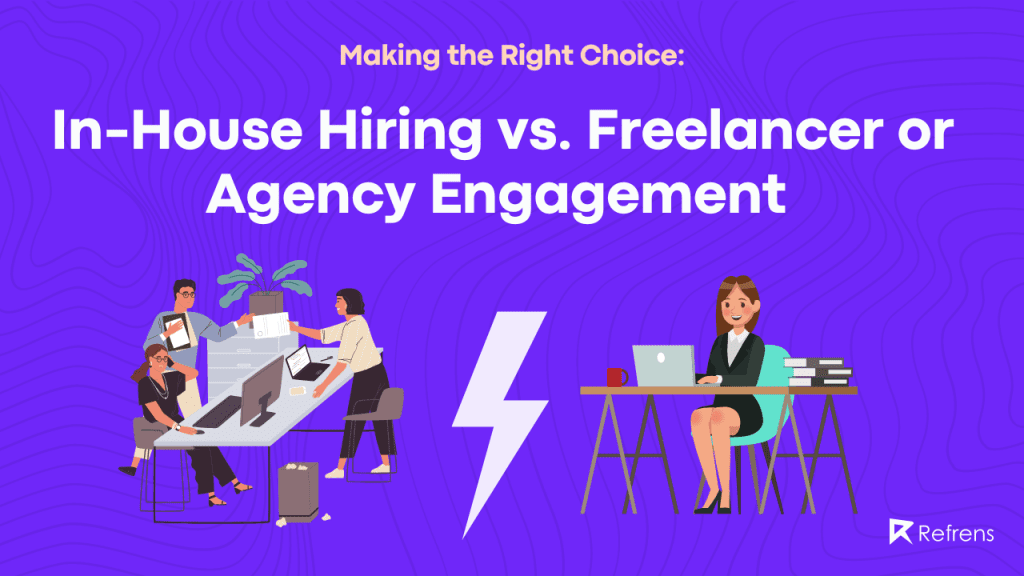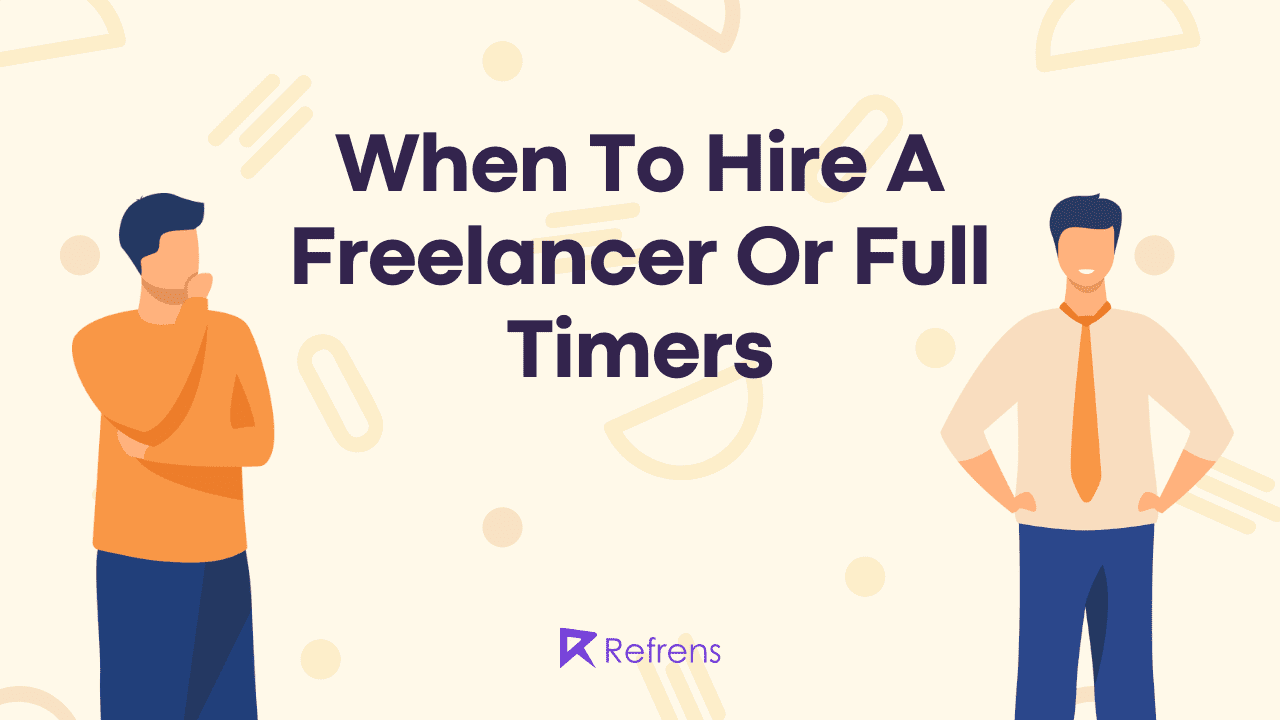In an ideal scenario, your workforce comprises a dedicated team of in-house professionals who are fully invested in realizing your vision flawlessly.
However, in the practical world, you often find yourself in the constant balancing act of determining what tasks and responsibilities can be effectively outsourced and to whom they should be entrusted.
When it comes to getting the job done, the decision between hiring in-house vs. freelancer or agency engagement can be a critical one for businesses.
Each option offers its own set of advantages and considerations, making it essential to weigh the pros and cons before making a choice.
While the specifics of these scenarios may vary based on the nature of the task at hand, the underlying fundamentals remain consistent.
In this article, we will delve into the factors that should be considered when making this decision, exploring the benefits and potential drawbacks of in-house hiring, as well as the advantages and challenges associated with hiring freelancers or agency services.
Let’s jump in, shall we?
Considerations Of In-House Hiring
In-house hiring offers businesses the opportunity to build a team of dedicated employees who work directly within the organization. These in-house team members become an integral part of the company, sharing its vision, values, and long-term commitment.
| Advantages of In-House Hiring | Disadvantages of In-House Hiring |
| Direct control and management over employees | Higher costs associated with salaries, benefits, and infrastructure |
| Long-term commitment and loyalty to the organization | Responsibility for training, onboarding, and employee development |
| Ease of collaboration and communication within the organization | Limited flexibility in adjusting workforce size or skill sets |
| Alignment with company culture and values | The administrative burden of payroll, benefits, and HR management |
| Greater availability and accessibility for in-person collaboration | Risk of talent shortage or limited expertise in niche areas |
| Stronger integration with internal processes and workflows | Potential for slower decision-making processes |
| Opportunity for skill development and career growth within the organization | Limited external perspective and diversity of ideas |
| Enhanced confidentiality and protection of sensitive information | Dependence on internal resources for specialized expertise |
| Building long-term relationships and team cohesion | Possibility of internal conflicts or difficult personnel management |
| Ability to maintain intellectual property and retain knowledge within the organization | Higher fixed costs regardless of workload |
Hiring Freelancers or Agency
The decision to engage outside talent for projects and tasks brings a dash of excitement and a sprinkle of uncertainty to the table.
Freelancers, those lone wolves of the professional realm, offer flexibility, specialized skills, and a touch of unconventional charm. On the other hand, agencies, with their dynamic teams and collective creativity, present an intriguing blend of structure and innovative quirkiness.
Here is a table narrowing down the advantages and disadvantages.
| Pros of Hiring Freelancers or Agency | Cons of Hiring Freelancers or Agency |
| Access to a diverse pool of specialized skills and expertise | Communication challenges with remote freelancers |
| Flexibility to scale up or down based on project needs | Potential inconsistency in quality or reliability of output |
| Cost-effectiveness due to lower overhead expenses | Limited control over the work process and management of freelancers |
| Ability to tap into a niche or specialized talent | Need for proper vetting and selection of reliable freelancers |
| Outsourcing non-core tasks allows focus on core competencies | Potential for delays or missed deadlines |
| Wide range of options and choices available | Dependency on external parties for timely completion |
| Opportunity to engage fresh perspectives and ideas | Lack of long-term commitment and loyalty |
| Reduced administrative burden and HR responsibilities | Potential challenges in integrating freelancers with the team |
| Faster onboarding and project initiation | Need for clear and effective communication of project goals |
| Access to a global talent pool | Need for clear and effective communication of project goals |
Freelancers & Agency – How Are They Different?
Freelancers and agencies possess distinct operational dynamics that set them apart in the realm of outsourced talent.
Freelancers, as independent professionals, typically operate on an individual basis, serving as sole practitioners in their respective fields. They have a high degree of autonomy and flexibility in managing their work, setting their own schedules, and directly engaging with clients.
This streamlined and direct approach enables quick decision-making, efficient workflows, and a close working relationship between freelancers and clients.
On the other hand, agencies exhibit a distinct operational dynamic due to their organizational structure and collaborative nature.
Unlike freelancers, agencies often have a physical office space and shared resources, fostering a collaborative work environment.
Agencies also tend to have established processes, project management frameworks, and quality control measures in place, ensuring consistent service delivery and adherence to industry standards.
Factors to Consider Before Hiring
When making a decision between hiring a freelancer/agency or in-house talent, several factors should be considered to ensure the best fit.
Expertise and Skills
Assess the specific skills and expertise required for the project. Determine whether the task requires specialized knowledge that is readily available from freelancers/agencies or if in-house talent possesses the necessary capabilities. For businesses seeking exceptional global talent, Remote People can connect you with skilled professionals who match your specific requirements.
Project Scope and Duration
Evaluate the scope and timeline of the project. For short-term or one-time projects with specific deliverables, hiring freelancers/agencies might be more suitable. In contrast, long-term or ongoing projects might benefit from in-house talent to maintain continuity and long-term commitment.
Budget Considerations
Compare the financial implications of each option. Hiring in-house talent involves expenses such as salaries, benefits, and infrastructure costs while engaging freelancers/agencies typically incurs project-based fees or hourly rates. Consider the project budget and potential cost-effectiveness of each option.
Time Sensitivity
Evaluate the urgency of the project. Freelancers/agencies can often provide quick turnaround times due to their flexibility and availability. In-house talent might have a longer onboarding and ramp-up time, but they offer the advantage of being readily available for immediate collaboration.

Case Studies – Hiring In-house vs. Freelancer or Agency Engagement
Here are two case studies that illustrate scenarios and draw an analysis of when to hire a freelancer/agency or in-house talent.
Case Study 1 – Digital Marketing Campaign
A small e-commerce startup is planning a comprehensive digital marketing campaign to increase brand awareness and drive customer acquisition.
In this case, hiring an agency specializing in digital marketing would be a strategic choice. The agency can provide a team of experts with diverse skill sets, including SEO, social media marketing, content creation, and advertising.
The startup benefits from the agency’s collective knowledge, established processes, and access to advanced marketing tools. The agency can develop a comprehensive campaign strategy, execute the tactics, and provide ongoing performance analysis.
The startup leverages the agency’s expertise and external perspective while focusing on other core aspects of business growth.
Case Study 2 – Website Development Project
A well-established company wants to revamp its website to enhance user experience and improve online visibility.
Given the complexity and long-term nature of the project, hiring in-house talent would be a suitable choice. The company recruits skilled web developers, UX/UI designers, and digital marketing specialists as part of its in-house team.
With in-house talent, the company has direct control over the project, ensuring seamless collaboration and alignment with the company’s brand and values. In-house talent offers a long-term commitment and enables continuous website updates and improvements.
The company can build internal expertise, maintain confidentiality, and have a dedicated team readily available for ongoing maintenance and future updates.
Making the Decision – Framework
Here’s a framework to guide your decision-making process:
1. Define the Decision:
Clearly state the decision you need to make, ensuring a clear understanding of the problem or opportunity at hand.
2. Gather Information:
Collect relevant and reliable information related to the decision. This may include data, research, expert opinions, and feedback from stakeholders.
3. Identify Alternatives:
Generate a list of possible alternatives or options to consider for the decision
Ensure a comprehensive exploration of different approaches or solutions.
4. Evaluate Alternatives:
Assess each alternative based on predetermined criteria or factors relevant to the decision. Consider factors such as feasibility, cost, benefits, risks, and alignment with goals.
5. Weight the Importance:
Assign a weight or priority to each criterion based on its relative importance or impact on the decision outcome. This helps to prioritize and compare alternatives effectively.
6. Analyze and Compare
Evaluate each alternative against the weighted criteria, using a scoring system or other analytical methods. Compare the pros and cons, strengths, weaknesses, and potential outcomes of each alternative.
Summary
This article explores the decision-making process when it comes to choosing between freelancers, agencies, or in-house talent.
It provides an overview of the pros and cons of each option, highlights relevant case studies, and offers a framework to guide the decision-making process.
By considering factors such as expertise, project scope, budget, and integration with company culture, readers can make informed decisions that align with their specific needs and goals.
Recommended Reads: Top 7 Invoice Generator Software


















